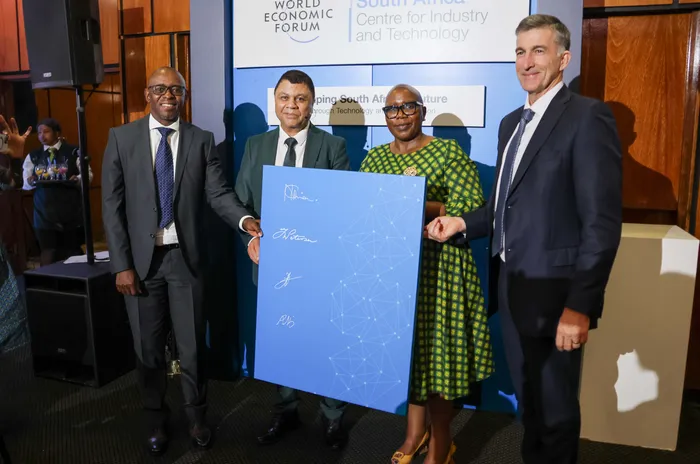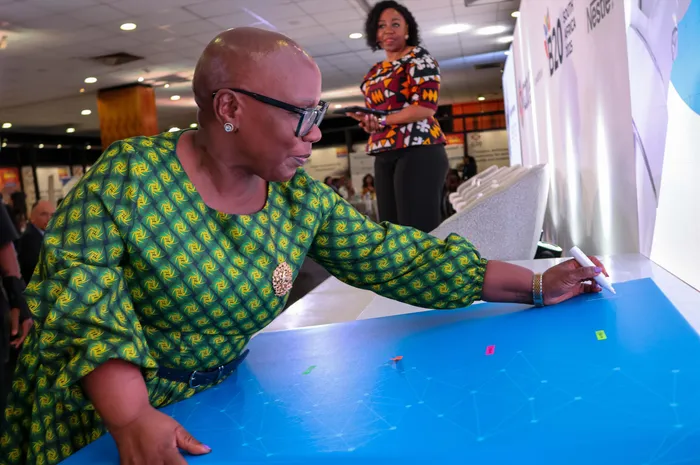
Dr Thulani Dlamini (CSIR), Prof Francis Petersen (UP), Nomalungelo Gina (DSTI) and Andrew Kirby (Toyota SA)
Image: Supplied
Deputy Minister of Science, Technology and Innovation Nomalungelo Gina applauded the recent launch of the South African Centre for Industry and Technology (SACIT) – the first South African member of the World Economic Forum’s global network of Centres for the Fourth Industrial Revolution (C4IR) – saying that the Centre could help South Africa’s manufacturing industry reach its full potential.
Gina was speaking at the launch of SACIT, which is hosted by the University of Pretoria (UP). The launch event, which was themed ‘Advancing Africa’s Industrial Transformation’, took place as part of a meeting of the G20 Research and Innovation Working Group Ministerial Meeting and the B20, the official business engagement group of the G20, held at the Council for Scientific and Industrial Research (CSIR) offices in Pretoria.

Nomalungelo Gina signing a commemorative plaque at the SACIT launch
Image: Supplied
With its launch, SACIT became the first South African member to join the WEF’s 4IR Network of 22 global centres.
Deputy Minister Gina emphasised that SACIT must build on South Africa’s existing strengths across its national system of innovation. “This requires coordination and synergy between government, academia, organised labour, civil society, business and industry towards innovation-led industrial development. Herein lies our economic resilience and sustainable development.”
UP Vice-Chancellor and Principal Professor Francis Petersen said universities can be powerful engines of industrialisation, but they are also social institutions responsible for cultivating the next generation of ethical citizens with integrity.

Prof Petersen giving an address at the SACIT launch
Image: Supplied
“With regard to their technical contribution to industrialisation, universities must produce skills that are both rigorous and relevant to the demands of industry,” he said. “This requires training that leverages transdisciplinary approaches to develop diverse solutions. However, the blurring of disciplines must extend beyond academia into sectors such as automotive, mining, finance, and food and nutrition, where collaboration and co-creation with universities can take place.”
Nicole Roos, Nestlé’s Managing Director for East and Southern Africa, and Co-Chair of the B20 South Africa Sustainable Food Systems and Agriculture Task Force, said, “Today we are standing united as South Africa, as Africa, and more importantly as the world, as we shape and thrive in an inclusive, resilient, and sustainable global economy. Nestlé’s participation in this B20 has really been core to our values. We are absolutely honoured to do work that addresses responsible, cultural and global challenges.”
Andrew Kirby, CEO of Toyota South Africa, and Chair of the B20 South Africa Industrial Transformation and Innovation Task Force, said: “We believe industrialisation is the key to unlocking inclusive and sustainable growth. The world is changing fast, technology is advancing, trade patterns are shifting, and the race to decarbonise is accelerating. Countries that adapt are creating jobs, building resilience, and leading in innovation; those that do not, risk falling behind.”
Although hosted at UP, SACIT will operate as an independent national centre. Its role is to unite knowledge and expertise from across academia, government, industry, and civil society. The centre will function through a central hub at UP that coordinates collaboration with multiple partners across a variety of projects and initiatives. SACIT will provide opportunities for international collaboration, enabling South Africa to benefit from global best practices while contributing its own insights to solving challenges on a worldwide scale.